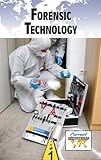Forensic technology / Sylvia Engdahl, book editor.
Material type: TextSeries: Current controversiesPublication details: Farmington Hills, MI : Greenhaven Press, c2011.Description: 258 p. ; 24 cmISBN:
TextSeries: Current controversiesPublication details: Farmington Hills, MI : Greenhaven Press, c2011.Description: 258 p. ; 24 cmISBN: - 9780737749113 (hardcover)
- 0737749113 (hardcover)
- 9780737749120 (pbk.)
- 0737749121 (pbk.)
- 363.25 22
- HV8073.8 .F67 2011
| Item type | Current library | Call number | Copy number | Status | Date due | Barcode | Item holds | |
|---|---|---|---|---|---|---|---|---|
 Book
Book
|
Karen H. Huntsman Library Main Book Collection - Second Level | 363.25 F7616 | 1 | Available | 38060007351729 |
Includes bibliographical references and index.
The quality of forensic investigation varies widely due to a lack of standards / National Research Council -- More research in forensic science is needed to prevent wrongful convictions / Peter Neufeld -- Both fraud and error in forensic investigation are common / Radley Balko and Roger Koppl -- There is no scientific basis for trusting fingerprint evidence / Simon A. Cole -- The defense now has the right to question forensic analysts during trials / Lyle Denniston -- Efforts to solve the problems of forensic science are already underway / Tabatha Wethal -- The official report on the state of forensics is interfering with prosecutions / Barry Matson -- Forensic technology has been wrongly criticized as unscientific / Crime Lab Report -- The TV drama CSI is affecting how jurors react in real-life trials / Richard Willing -- The CSI effect is leading to unwarranted acquittals / Jeffrey Heinrick -- Judges should take steps to counter CSI's influence on jurors / Joshua K. Marquis -- The criminal litigation process is being altered by fear of the CSI effect / Tamara F. Lawson -- Expectations of forensic evidence has no bearing on jurors' decisions / Donald E. Shelton -- The CSI effect exists only in the minds of those who propose it / Kimberlianne Podlas -- Wide media coverage of the CSI effect may itself influence jury reactions / Simon A. Cole and Rachel Dioso-Villa -- Recordings of brain activity show whether a fact is stored in someone's memory / Sam Simon -- Brain scanning accurately detects lies during experiments / Malcolm Ritter -- Hand-held lie detectors may be useful for screening purposes / Bill Dedman --The assumption that physical reactions can detect lying is not valid / Melissa Mitchell -- Brain scanning has not been sufficiently tested for public use / Aalok Mehta -- Voice stress analysis cannot adequately distinguish lies from truth / Kelly R. Damphousse -- Improved techniques for analyzing stains provide information about crimes / Matt Martin -- Micro-stamping of firearms is not an effective means of identifying criminals / Wendy Wang -- DNA testing is now being used with non-violent crimes / Dan Morse -- DNA samples can provide clues to a crime suspect's physical appearance / Evan Pellegrino -- CT scanning has many advantages over conventional autopsies / Douglas Page -- Attempts are underway to make bite mark analysis more scientific / Todd Richmond -- Soil analysis is becoming a powerful technique for crime investigation / Louise Murray -- Research on decomposing bodies provides important data for forensics / Mike Osborne.
1
There are no comments on this title.
